七年级英语下册Unit7AbilitiesPeriod7学案无答案新版牛津版
七年级英语下册 Unit 7 Abilities教案 (新版)牛津版-(新版)牛津版初中七年级下册英
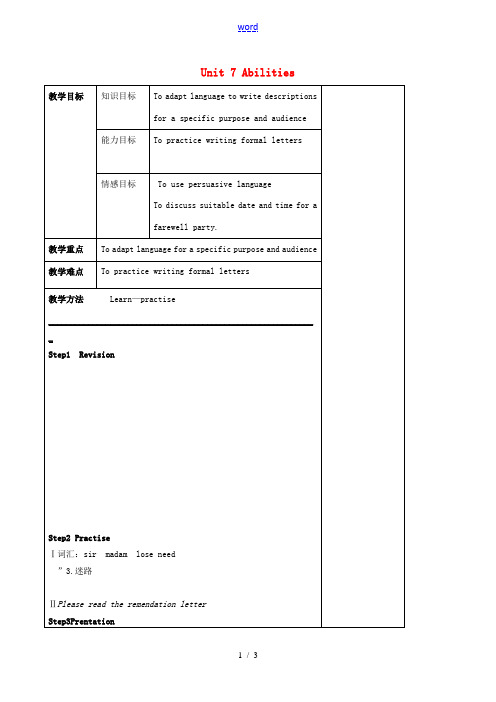
Introduction
The first paragraph tells the receiver what the letter is about.
Main body
The main body of the letter talks about different points in this order.
Unit 7 Abilities
教学目标
知识目标
To adapt language to write descriptions for a specific purpose and audience
能力目标
To practice writing formal letters
情感目标
To use persuasive language
Paragraph 2: ability of your classmate
Paragraph 3: personality of your classmate
Paragraph 4: what your classmate did
Conclusion
The last paragraph states(陈述)what you want from the receiver
Ⅱ.Daniel ist .
①He thinks __________ (careful) when he works.
②He plans everything __________ and works __________ in a team (good).
Ⅲ.Daniel iskandh .
Last week, a 5-year-old boy ____________________(迷路)and cried in the street. Daniel ______________(在去……的路上)theclub. He stayed with the boy and played with him __________(两个小时)before the boy’s parents came.
七年级英语下册 Unit 7 Abilities教案 (新版)牛津版
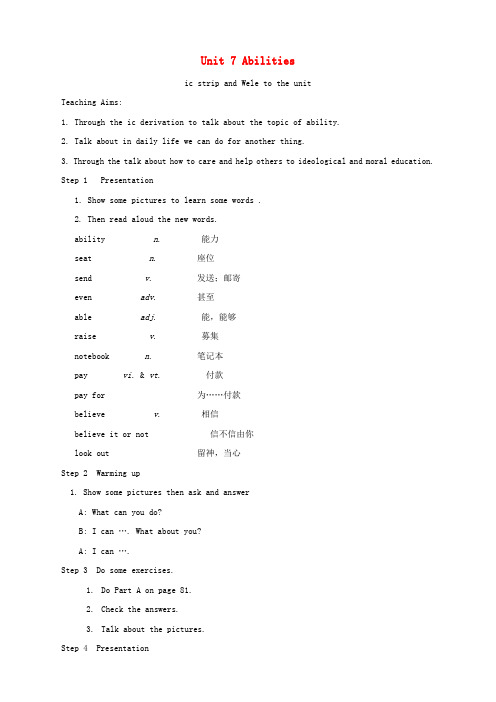
Unit 7 Abilitiesic strip and Wele to the unitTeaching Aims:1. Through the ic derivation to talk about the topic of ability.2. Talk about in daily life we can do for another thing.3. Through the talk about how to care and help others to ideological and moral education. Step 1 Presentation1. Show some pictures to learn some words .2. Then read aloud the new words.ability n. 能力seat n. 座位send v. 发送;邮寄even adv. 甚至able adj. 能,能够raise v. 募集notebook n. 笔记本pay vi. & vt.付款pay for 为……付款believe v. 相信believe it or not 信不信由你look out 留神,当心Step 2 Warming up1. Show some pictures then ask and answerA: What can you do?B: I can …. What about you?A: I can ….Step 3 Do some exercises.1.Do Part A on page 81.2.Check the answers.3.Talk about the pictures.Step 4 PresentationShow some pictures present ic strip.Step 5 Listen and answer1. Can Eddie fly?2. Read the dialogue in pairs.3. Act it out.Step 6 Listening1. Listen to part B and answer the following question.1) What can they do for the children in poor areas?2) Can they raise some money for them?2. Read after the recorder.3. Pratice in pairs.4. Act it out.5. Make their own dialogue.Step 7 Explanation1. How cool! 多酷呀!这是一个感叹句。
七年级英语下册 Unit 7 Abilities 全单元学案 (新版)牛津版
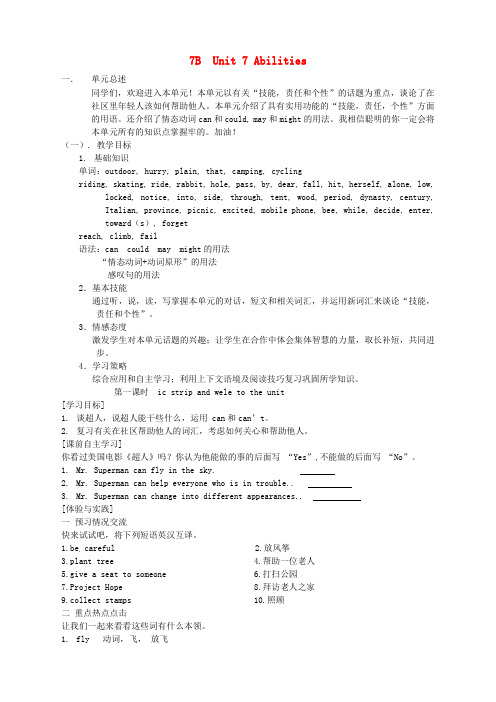
7B Unit 7 Abilities一.单元总述同学们,欢迎进入本单元!本单元以有关“技能,责任和个性”的话题为重点,谈论了在社区里年轻人该如何帮助他人。
本单元介绍了具有实用功能的“技能,责任,个性”方面的用语。
还介绍了情态动词can和could, may和might的用法。
我相信聪明的你一定会将本单元所有的知识点掌握牢的。
加油!(一). 教学目标1.基础知识单词:outdoor, hurry, plain, that, camping, cyclingriding, skating, ride, rabbit, hole, pass, by, dear, fall, hit, herself, alone, low, locked, notice, into, side, through, tent, wood, period, dynasty, century,Italian, province, picnic, excited, mobile phone, bee, while, decide, enter,toward(s), forgetreach, climb, fail语法:can could may might的用法“情态动词+动词原形”的用法感叹句的用法2.基本技能通过听,说,读,写掌握本单元的对话,短文和相关词汇,并运用新词汇来谈论“技能,责任和个性”。
3.情感态度激发学生对本单元话题的兴趣;让学生在合作中体会集体智慧的力量,取长补短,共同进步。
4.学习策略综合应用和自主学习;利用上下文语境及阅读技巧复习巩固所学知识。
第一课时 ic strip and wele to the unit[学习目标]1.谈超人,说超人能干些什么,运用 can和can’t。
2.复习有关在社区帮助他人的词汇,考虑如何关心和帮助他人。
[课前自主学习]你看过美国电影《超人》吗?你认为他能做的事的后面写“Yes”,不能做的后面写“No”。
七年级英语下册 Unit 7 Abilities导学案(无答案)(新版)牛津版
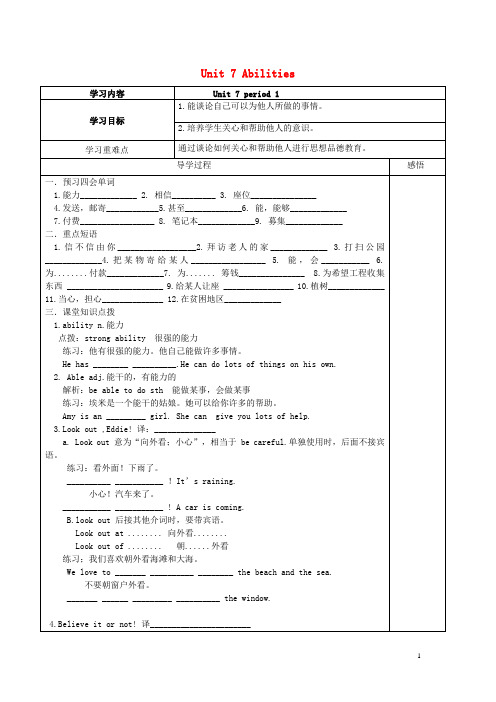
练习;我们喜欢朝外看海滩和大海。
We love to _______ __________ ________ the beach and the sea.
不要朝窗户外看。
_______ ______ _________ __________ the window.
4.Believe it or not!译_______________________
解析: believe动词意为:“相信,认为”其用法如下:
Sb表示相信某人说的话
Believe sth表示相信某事的真实性
t任,信奉”
练习:我信任他。
I _________ _________ him.
= He gave his seat ________ _________ ________ ________ on the bus.
他们给了我们很多帮助。
They gave ________ _________ _________ _________help
=__________________________________________________________.
Unit 7 Abilities
学习内容
Unit 7 period 1
学习目标
1.能谈论自己可以为他人所做的事情。
2.培养学生关心和帮助他人的意识。
学习重难点
通过谈论如何关心和帮助他人进行思想品德教育。
导学过程
感悟
1.预习四会单词
1.能力_____________ 2.相信__________ 3.座位_______________
解析:a.clean up意为“打扫干净,清理,清扫”
七年级英语下册 Unit 7 Abilities Task教案 (新版)牛津版
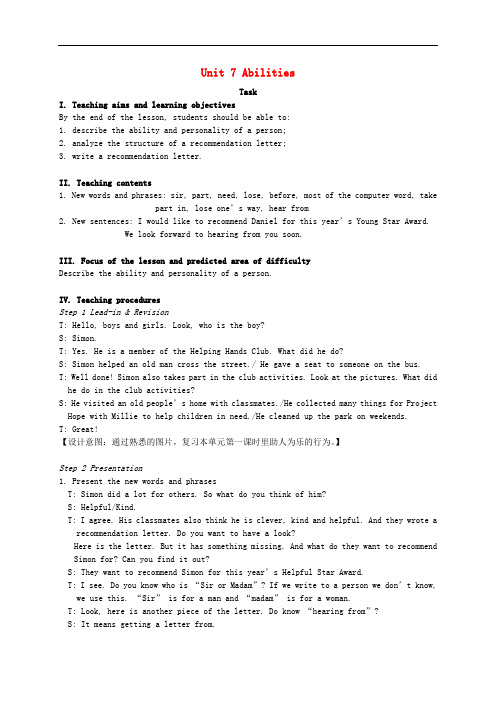
Unit 7 AbilitiesTaskI. Teaching aims and learning objectivesBy the end of the lesson, students should be able to:1. describe the ability and personality of a person;2. analyze the structure of a recommendation letter;3. write a recommendation letter.II. Teaching contents1. New words and phrases: sir, part, need, lose, before, most of the computer word, takepart in, lose one’s way, hear from2. New sentences: I would like to recommend Daniel for this year’s Young Star Award.We look forward to hearing from you soon.III. Focus of the lesson and predicted area of difficultyDescribe the ability and personality of a person.IV. Teaching proceduresStep 1 Lead-in & RevisionT: Hello, boys and girls. Look, who is the boy?S: Simon.T: Yes. He is a member of the Helping Hands Club. What did he do?S: Simon helped an old man cross the street./ He gave a seat to someone on the bus. T: Well done! Simon also takes part in the club activities. Look at the pictures. What did he do in the club activities?S: He visited an old people’s home with classmates./He collected many things for Project Hope with Millie to help children in need./He cleaned up the park on weekends.T: Great!【设计意图:通过熟悉的图片,复习本单元第一课时里助人为乐的行为。
七年级英语下册 Unit 7 Abilities Task教案 (新版)牛津版
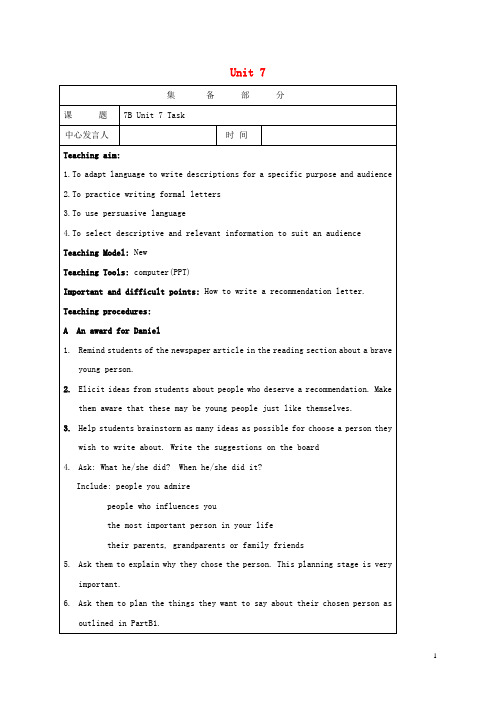
4.Ask: What he/she did? When he/she did it?
Include: people you admire
people who influences you
the most important person in your life
their parents, grandparents or family friends
5.Ask them to explain why they chose the person. This planning stage is very important.
9.Read the letter to the class.
B writing a recommendation letter
1.Sample writing
2.It is important that they check spelling, sentence construction and layout. Encourage them to help each other.
3.To use persuasive language
4.To select descriptive and relevant information to suit an audience
Teaching Model:New
Teaching Tools:computer(PPT)
牛津译林版七年级下册Unit7《Abilities》(Period7)说课稿

牛津译林版七年级下册Unit 7《Abilities》(Period 7)说课稿一. 教材分析《Abilities》是牛津译林版七年级下册Unit 7的一篇课文,主题是关于能力的。
通过描述不同人物的不同能力,让学生学会如何用英语表达能力和描述人物。
本节课的主要内容是让学生掌握abilities的用法,以及如何用if引导的条件状语从句。
二. 学情分析七年级的学生已经掌握了基本的英语语法和词汇,但对于abilities的用法和if引导的条件状语从句还比较陌生。
因此,在教学过程中,需要逐步引导学生理解和掌握这些知识点。
同时,学生对于描述人物的能力较强,可以借此机会让他们更好地运用英语表达自己。
三. 说教学目标1.知识目标:让学生掌握abilities的用法,学会用英语表达能力和描述人物;让学生理解并学会if引导的条件状语从句。
2.能力目标:通过小组合作和角色扮演等活动,提高学生的口语表达能力和团队协作能力。
3.情感目标:培养学生对英语学习的兴趣,增强自信心,使他们更加积极地投入到英语学习中。
四. 说教学重难点1.重点:abilities的用法,if引导的条件状语从句。
2.难点:如何正确运用abilities描述人物,以及如何灵活运用if引导的条件状语从句。
五. 说教学方法与手段1.情境教学法:通过设置各种情境,让学生在实际语境中学习和运用abilities和if引导的条件状语从句。
2.任务型教学法:通过小组合作和角色扮演等活动,让学生在完成任务的过程中学习和运用所学知识。
3.直观教学法:利用图片、视频等直观教具,帮助学生更好地理解和记忆知识点。
六. 说教学过程1.导入:以一个关于能力的短片引入新课,让学生对abilities和if引导的条件状语从句有一个初步的了解。
2.新课呈现:通过展示图片和视频,引导学生学习abilities的用法,以及if引导的条件状语从句。
3.语法讲解:讲解abilities的用法,让学生学会如何用英语表达能力和描述人物。
七年级英语下册Unit7Abilities导学案(无答案)(新版)牛津版
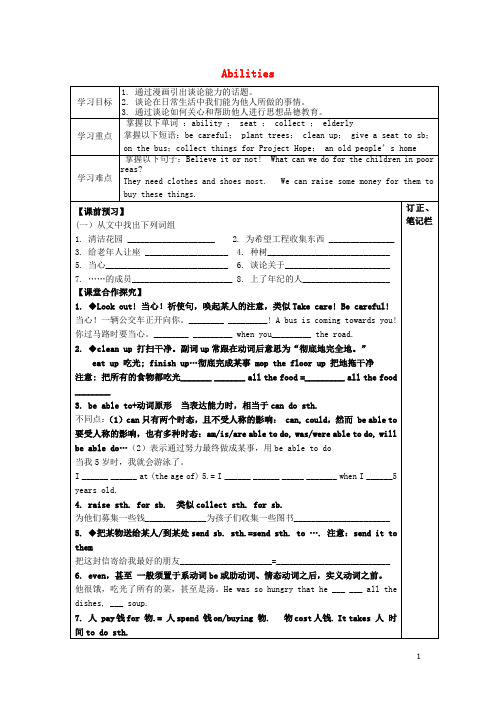
( ) 6. He’s good at________,____________and____________.
3. be able to+动词原形当表达能力时,相当于can do sth.
不同点:(1)can只有两个时态,且不受人称的影响:can, could,然而be able to要受人称的影响,也有多种时态:am/is/are able to do, was/were able to do, will be able do…(2)表示通过努力最终做成某事,用be able to do
Abilities
学习目标
1.通过漫画引出谈论能力的话题。
2.谈论在日常生活中我们能为他人所做的事情。
3.通过谈论如何关心和帮助他人进行思想品德教育。
学习重点
掌握以下单词:ability;seat;collect;elderly
掌握以下短语:be careful;plant trees;clean up;give a seat to sb;on the bus;collect things for Project Hope;an old people’s home
8. I believe/think (that)从句否定要前移。
我相信他不会花太多钱在游戏上的。I ______ ______ he ______ spend much money on games.
【反馈练习】
一.单项选择:
( ) 1. ______________ is Tree planting Day in China.
他很饿,吃光了所有的菜,甚至是汤。He was so hungry that he ___ ___ all the dishes, ___ soup.
七年级英语下册Unit7AbilitiesCWV教案新版牛津版
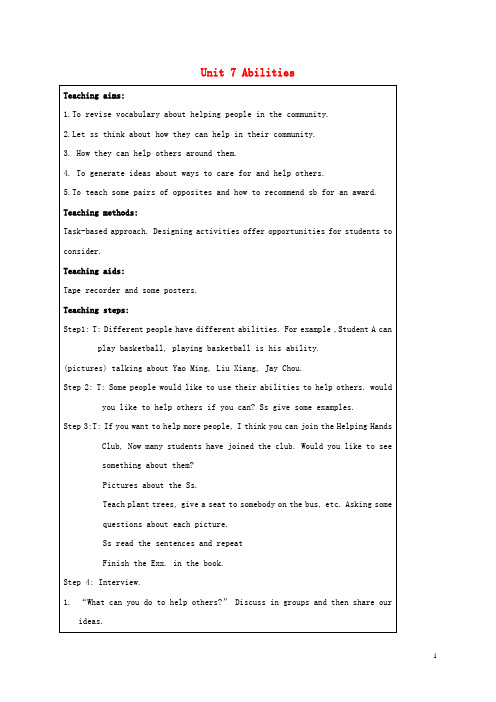
Teaching aims:
1.To revise vocabulary about helping people in the community.
2.Let ss think about how they can help in their community.
3.How they can help others around them.
Step 8: Teach the students how to recommend sb for an award.
Step 9: Homework given.
Pictures about the Ss.
Teach plant trees, give a seat to somebody on the bus, etc. Asking some questions about each picture.
Ss read the sentences and repeat
T: Hobo thinks He is a superdog. Llisten, what happened to him?
Step 6:Listen to the tape and answer the four questions.
Read the dialogue
Step 7: Act out the dialogue and finish some exercises.
Finish the Exx. in the book.
Step 4: Interview.
1.“What can you do to help others?”Discuss in groups and then share our ideas.
七年级英语下册 Unit 7 Abilities 全单元教案 (新版)牛津版
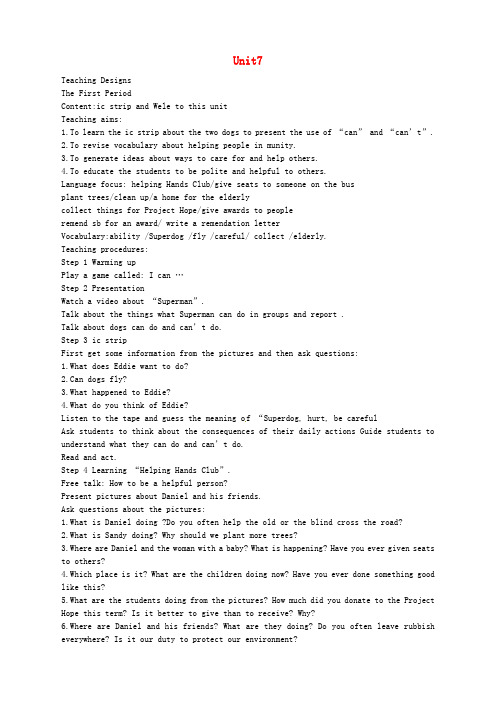
Unit7Teaching DesignsThe First PeriodContent:ic strip and Wele to this unitTeaching aims:1.To learn the ic strip about the two dogs to present the use of “can” and “can’t”.2.To revise vocabulary about helping people in munity.3.To generate ideas about ways to care for and help others.4.To educate the students to be polite and helpful to others.Language focus: helping Hands Club/give seats to someone on the busplant trees/clean up/a home for the elderlycollect things for Project Hope/give awards to peopleremend sb for an award/ write a remendation letterVocabulary:ability /Superdog /fly /careful/ collect /elderly.Teaching procedures:Step 1 Warming upPlay a game called: I can …Step 2 PresentationWatch a video about “Superman”.Talk about the things what Superman can do in groups and report .Talk about dogs can do and can’t do.Step 3 ic stripFirst get some information from the pictures and then ask questions:1.What does Eddie want to do?2.Can dogs fly?3.What happened to Eddie?4.What do you think of Eddie?Listen to the tape and guess the meaning o f “Superdog, hurt, be carefulAsk students to think about the consequences of their daily actions Guide students to understand what they can do and can’t do.Read and act.Step 4 Learning “Helping Hands Club”.Free talk: How to be a helpful person?Present pictures about Daniel and his friends.Ask questions about the pictures:1.What is Daniel doing ?Do you often help the old or the blind cross the road?2.What is Sandy doing? Why should we plant more trees?3.Where are Daniel and the woman with a baby? What is happening? Have you ever given seats to others?4.Which place is it? What are the children doing now? Have you ever done something good like this?5.What are the students doing from the pictures? How much did you donate to the Project Hope this term? Is it better to give than to receive? Why?6.Where are Daniel and his friends? What are they doing? Do you often leave rubbish everywhere? Is it our duty to protect our environment?Read and understand the sentences.Step 5 Make a surveyFill in the table about what you have done in your daily life at school to see if you area polite and helpful boy/girl? If not ,What should you do next?1.Can you Say hello to teachers when you meet them?2.Can you clean the classroom carefully when you are on duty?3.Can you pick up the rubbish in the classroom or around the campus?4.Can you help your classmate with their homework?5.Can you help stand in line at dinner time?6.Can you give the thing back to the person who lost it?7.Can you do something good to your teachers?8.Can you look after the things in our classroom?9. Can you take care of your classmate who is ill?10.Can you keep our classroom clean and tidy?To see how many are good enough and how many should improve their behavior.Group work: What can /can’ you do in public? then ask the group leader to have a report. Step6 Assignment:1.Recite the dialogue and remember the sentences on Page 73.2.Writing: “How to be a helpful person ?”The Second PeriodContent: Reading-- A brave girlTeaching aims:1.To introduce and expand vocabulary to describe dangerous situations.2.To guess context from the text type, the title and the picture.3.To infer general meaning from picture and actions.4.To identify the name of specific places and actions.5.To skim the text for overall meaning and scan for detail.Language points and focus:Award for Bravery/help sb out of a fire/be alone/hear sb shouting/a 79-year-old man pour water over/put out the fire/be in hospital/help each other/be careful withFire can be dangerous.It is important to be careful with fire.Teaching proceduresStep 1.RevisionRevise what the children learned in the last period.1..be careful2.Helping Hands Club3.give seat to someone on the bus4. collect things fo r Project Hope5.Clean up the park/playground6.visit a home for the elderly7. plant trees 8.a SuperdogStep2 Reading1. warming up: Talk about danger and potential hazards at home. Ask if any students have ever had an accident at home. Talk about what to do in case of danger.2.Watch a set of pictures about a fire to present the new words:neighbor, smoke, fire, rush, dangerous, burn, hurt, pour, rush, save, blanket, put outthe fire3. Read the story and try to get some information. Then say T or F according to the text.1).Lin Tao helped her classmate out of a fire.2).Lin Tao’s neighbour is 79 years old.3).Mrs Sun couldn’t get out because he hurt his arm.4).Lin Tao was afraid when she saw a lot of smoke.5).Lin Tao put out the fire with a blanket and helped Mrs Sun out.6).The fire burned Lin Tao’s neck and leg.7).Lin Tao was in hospital for two months.8). Lin Tao said she was glad to help others and fire was not dangerous.4. Listen and read after the text and ask questions.1).How old is the brave girl?2).When did she help her neighbour out of a fire?3).How old is Mrs Sun?4).Where was Mrs Sun when there was a fire?5).Why couldn’t Mrs Sun get out of her house?6) How did Lin Tao put out the fire?7).Did Lin Tao hurt himself?8).How long was Lin Tao in hospital?5.Discuss any problems about the text.6.Game :Write the definitions fromPartB1 on the cards. Mix up the cards and let each group guess the word and read out the word. One who gets the most cards is the winner.7.Have an interview.First fill in the blanks and read the conversation. Then have an interview in groups. One is Lin Tao, the others are the reporters.8 Discuss in groups. What does the writer think of Lin Tao? What do you think about her? Why do you think so? What do you do when you meet the accident like this?Step3Assignment1. Recite the new words and read the text.2.Finish the exercises in the workbook.3.Prepare the interview for the brave girl.The Third PeriodContent:Reading 2Teaching aims:1. Further understanding the text.2. Learn more about fire safety.3.To use different suitable adjectives to describe people’s behavior and character.4.Introduce the use of the prefix un- and suffix –less to form opposites. Language points:Learn more about fire.Be careful with matches.Don’t leave the stove on.Don’t put anything hot into the rubbish bin.Keep long hair away from fire.Remend sb for sth., think of sbTell sb to do sth, fall into waterBe grateful for sth/to sb,Teaching procedures:Step 1.RevisionRevise the vocabulary in the text by giving the definitions.Ask students to read the text after the tape again.Let students ask and answer questions about the story.Revise the key words phrases and sentences .1.help sb out of a fire help with /(to)do sth.2.alone/lonely eg:I often stay home alone on Sundays but I don’t feel lonely.3.hear sb do /doing sth; see do/ doingI often hear the girl next door play the piano in the morning.Last night when I was doing my homework, suddenly I heard someone shouting ”help! Help!”.4 a 79-year-old Mrs Sun an 8-day holiday two-hour homework5.hurt The boy fell off the bicycle and hurt his leg. hurt by fire6.pour… over7.put out the fire put on/ up/down/ into/away8. be in hospital/be in the hospital Grandpa is ill badly today. Now he is hospital. His fater works in the hospital.9.It is important to be careful with fire. Be care with sth Children must be careful with matches.10.keep one’s life from danger keep … from I should keep my father from smoking.11.Thank you for joining us this evening.Step 2 Visit Lin Tao in hospitalFirst read the task to understand it.Read the dialogue to find out and correct the mistakes.Read the conversation in pairs.Act it ou t.Step3 An interviewDo it in groups. In each group one student can be Lin Tao, the others can be reporters to interview her. Then choose some groups to perform .Step4.Fire safetyRead the sentences and match the right pictures.Read out the sentences.Notes: leave …on , keep away fromAsk students to think of other ways about fire safety. Eg: Don’t run on the stairs. Don’t play on the road. Don’t lean out the window.Step5.Assignment:1. Revise what we learned from P74-76 and remember the new words.2 Do some exercises.The Fourth PeriodⅠ.Content:Grammar A:Using “can”/ “could” to talk about abilityⅡ.Preparation:1 Revise the use of Model Verbs and learn about positive, negative and question sentences.2.Make a list of things that the students can do by themselves now.(At least ten kinds) Ⅲ.Teaching Aims:To recognize and understand how to use “can” and “could” to express ability in the present and past.Ⅳ.Important and Difficult Points:“Could” is us ed to express ability in the past.Ⅴ.Teaching Procedures:Step 1. Warming up.1)Make a survey.“What can you do now?”Ask:Can you ride a bike / swim / fly a kite / play football / play chess?Yes , I can. / No, I can’t.Show the students’ answers on the s creen .SportsStudent AStudent BRide a bikeSwimFly a kitePlay footballPlay chessThen ask the others:Can she / he …?2.Say the whole sentences:eg: A. can ride a bike.He can’t / cannot swim.…(Write them down on the blackboard.)Get the students to repeat and talk about student B like above:3) Work in pairsAsk the partner more questions like above and write down their answers , then report to the class.Step 2. Presentation.1) Ask student A and B again:Could you ride a bike five years ago ?(Help them answer:Yes, I could./ No, I couldn’t.)2) Get the students to ask the teacher about the past of A and B.Could he / she …? (Yes, he / she could. / No, he / she couldn’t.)3) Teach the students to say the whole sentences:A could ride a bike five years ago.He couldn’t swim five years ago.……(The same as B)4) Use “could” to ask the partner the same questions about the past, then repeat.5) Work out the rule.① Positive: can could② Negative: can’t Couldn’t③Question: Can …?Could …?Step 3. Practice.1)Work alone.(Part A1)2) Get the students to report themselves like above.3) Talk about the tables freely. in pairs.eg. Can Sandy row a boat now?Could he do it last year?4) plete the conversation of Part A2.5) Explain:We can use “am (is , are) able to “ instead of “can”,and “was (were) able to “ instead of “could“.eg.①Mike can sing more than 20 English songs.Mike is able to …②She could speak English when she was four.She was able to…Get the students to give more examples.Sum up:1)The differences between “can” and “be able to”2) Another use of “can” & “could”:Eg.Can / Could I help you?Step 4. Consolidation:Work in groups of six.Make a survey, then report to the class.Things to doCould do before(number of students)Can do now(number of students)Tell storiesWrite English wordsDo houseworkPlant treesFeed animalsMake dinnersStep 5. Extension.1.Make up a dialogue between Jim and the headmaster according to the following hints. Jim wants to apply for(应聘)an English teacher .Here are his bri ef introduction: Experience: taught Chinese and English in No.3 Middle school.Played football in the school team.Abilities: drawing , singing , playing with puters.Inabilities: dancing, Teaching other subjects ,such as maths ,play volleyball(now forgot) 2.Write a letter to your friend and tell him / her about what you have learned since(自从…以来) you came to secondary school.Step 6. Homework:Ex A on page 49 of the workbook.The Fifth PeriodⅠ.Content:1.GrammerB:Using “can”/ “could” to talk about possibility.2.GrammerC:Using “may” and “might” to talk about chances..Ⅱ.Preparation:Get the students to prepare something that will or wo n’t happen if we do so or don’t do so.No.Do so / Don’t soPossible / impossible to happen1Work hardPass the exam23…Ⅲ.Teaching Aims:1.To learn how to use “can” and “could” to talk about possibility.2.To recognize degrees of possibilities when using “may” and “might”..Ⅳ.Important and Difficult Points:The differences between “may” and “might”.Ⅴ.Teaching Procedures:Step 1. Guessing a riddle.It can live in water. It can breathe under water. It can swim. It can live in a glass bowl. People can feed and watch them every day. What is it?(A goldfish)Step 2. Revision.Make different kinds of sentences with “can” and “could”.1)read English story books.(last year)2)mend puters.(two years ago)3)help Mother do housework.(at the age of seven)Step 3. Presentation.1.Say:①Zhang Hua works hard. It is possible for him to pass the exam.(He can pass the exam)② Nick didn’t bring a football to school.It is not possible for us to play football after class.(We can’t play football after class.)③It was sunny last Sunday. It was possible for the children to go to the park.(The children could go to the park)④Millie had no money yesterday. It was not possible for her to buy that coat.(She couldn’t buy that coat.)2.Show the sentences above on the screen and explain them to the students:We use “can” / “could” to say that something is / was possible to happen.3. Get the students to explain with “possible”.①Fire can be dangerous if we are not careful.②Mr. Sun can’t be at home because I saw him at school just now.③I didn’t lose my key so I could get in.④Mr. Sun could not get out because he hurt his leg.Step 4. Practice:1. Fill in the blanks.2. Work in pairs to talk about something that can / could / can’t / couldn’t happen.3. Report to the class.4. Explain:If we think something is sure to happen, We’d better use “must”.eg.I saw Mr Yang in the library a moment ago. He must(一定) be in the school now.(Get the students to give more examples)Step 5. Presentation.1. Ask:May I speak to …?May I take this picture away?2.Introduce the idea that we also use “may” and “might” to express possibilities. eg.I am free today, I may go on an outing.He feels very tired, He might have a good rest at home.3.Explain the tables at the top of the page.Note:1)“Might” is the past from of “may”, but here it is also used to express degrees of possibilities.2)The dif ferences between “my/might” and “can/could”.Step 6.Practice.1.Fill in the blanks alone, and try to underline the keywords that the answers e from, then check the answer.2.Explain: maybe / may be3 Read the table and plete the sentences.The members of the Helping Hands club want to look after Mr. Sun in hospital Please infer the possibilities according to the tables and fill in the blanks with “may (not)” or “might (not)”.NameDays an d TimeNear PlansDanielMonday(16:00—18:00)Go to the Reading Club(15:30—18:00)SandyTuesday(16:30—18:00)Go to the Music Club(14:00—15:30)SimonWednesday(15:45—18:00)Have a football match(13:00—15:40)KittyThursday(16:15—18:00)Go to the Dancing Club(18:00—20:00)AmyFriday(15:30—17:40)Have Swimming Lessons(17:30—21:00)MillieSunday(8:00—11:00)Have nothing to do this day.1.Daniel go and see Mrs Sun on Monday.2.Sandy go to see Mrs Sun on Tuesday.3.Simon go to the hospital to help Mrs Sun on Wednesday.4.Kitty go to help Mrs Sun on Thursday.5.Amy help Mrs Sun on Friday.lie go to help Mrs Sun on Sunday.(Key:1.may not 2.may 3.might 4.might 5.might not 6.may)Step 7.Extension.You are trapped into a lonely island. How can you escape ? Please think of more ways. You’d better make sentences with “may” or “might”.Step 8. HomeworkDo more exercises.The Sixth PeriodContent:Integrated skillsTeaching aims: 1. Learn to write a profile.2. Learn to talk about what you can and cannot do.3.To develop the students’ abilities of listening ,speaking,reading and writing. Language focus: do one’s b est, be weak at, have\get good grades\results in, no problem. Teaching procedures:Step 1: Warming upPlay a game: Who is he\she ?Eg: She has a round face and two big eyes. She has long hair in a ponytail. Who is she ? Step 2:Daily report : A profile of myself .Ask and answer about it .Step 3: Pre- task preparation1. Ask some very general questions about reports and school .2.Present some new words : term,memory,history,geography,personality,cheerful,organize,result.Step 4: Task proceduresPart A:1 Reading(1)Ask students to skim the text to identify any words they don’t know .(2)Ask students to guess the meaning of the unkno wn words from the context .(3) Explain the meaning by giving examples .(4) Ask students to list as many adjectives as they can find . Then ask them to add other adjectives that teachers may use to describe students .(5) Ask students to study the notes for the parents’ meeting . Then ask them to find information from the report card to fill in as many gaps as possible .2 . Listening(1) Play the recorder and ask students to plete Mr Wu’s notes .(2) Play the recorder again to enable students to check their answers .(3) Ask some students to read out their answers .3 . WritingA: plete the profile of Suzy :(1) Ask students to use information from the report card and notes to plete Suzy’s profile .(2) Ask them to guess the meaning of the new words : grade,result,high .(3) Read it and work out the way of writing a profile .(Group work )B: Write a profile :(1) Divide the class into groups . Ask them to write a profile .(2) Invite some groups to show their results .3.Speaking ( Part B )(1) Listen and answerCan Mil lie dance ? What about Sandy ?What can Sandy do ?(2) Listen and read(3) Read in pairs(4) Make similar dialogues and act out their own dialogues .Step 5 : Assignment1.Oral work : Make a dialogue about talking about what you can and cannot do .2.Written work : Write a profile of your friend .The Eighth PeriodContent:Main task1. Learn to write a remendation letterTeaching aims : 1. Learn to write a remendation letter2.To develop students’ ability of writing .Language focus: a five-year-old boy, lose one’s way, hear fromTeaching procedures :Step 1: Warming upA chain talk .eg: A: Can you tell me what you can do and cannot do ?B: I can sing but I can’t sing well. Can you tell me what you can do and cannot do ?C: I can dance well but I can’t swim…….Step 2 : Free talkeg :Who can get the Most Helpful Student Award ? Why ?Step 3 : Pre-task preparationPresent some new words : chairperson,thoughtful,lose,hear fromStep 4 : Task procedures:1.Learn how to write a remendation letter(1) Listen and answer (Part 1)Q: What award would he like to remend Chen Dan ?What is Chen Dan good at ?What’s his personality ?What did he do ?(2 )Explain the words above.(3)Rea d it carefully and put the numbers in the correct boxes .(4)Read it again and find out the key aspects of the content of the letter .(Group work )(5)Conclusion about how to write a remendat ion letter.2. Write a remendation letter (Group work )(1) Ask students to plan the things they want to say about their chosen person as outlined in Part B1.(2) plete the letter . ( Each writes one paragraph. )(3 Invite some groups to read out their letters .Step 5 : AssignmentWrite a remendation letter.Exercises(Grammar of Unit 7,7B)Ⅰ.选择填空:( )1.Can you write a letter in English? No, I .A. may notB.mustn’tC.can’tD.needn’t( )2.He said that he swim when he was six.A.mightB.couldC.canD.would( )3.You go and ask Meimei. She know the answer.A.must,canB.must, mayC.need, canD.can,may( )4.May I e in ?A.Yes, pleaseB.No,you couldn’tC.Yes,you mustD.No,you needn’t( )5. I have some bottles of orange?A.DoB.CouldC.Don’tD.Would( )6.--- I vist Jack on Sunday?---Yes, you .A.Must,canB.May,mayC.Need,needD.May,need( )7.He doesn’t play football very often, I’m sure he lose the game.A.canB.can’tC.mayD.may not( )8.That man be her son.He left for Shanghai this morning.A.can’tB.mustn’tC.needn’tD.shan’tⅡ.用 can / may的正确形式填空(包括其否定形式):1.It is hot summer in Australia. We go awimming there.2.The library is closed now. We borrow many books today.3.Debbie is very clever. He solve the problem.4.Helen learn from books because she was blind(瞎的) when she was young.5.The door is open. He be at home.6.The door is closed. He be at home.7.Don’t run about in the street. A car hit you.8.---- I smoke here, sir?----No,you .9.Meimei ride a bicycle when she was five. Look at the picture. She was falling off her bike.Ⅲ.句型转换:1. Our team can win the game if we play well.否定句一般疑问句2. Lucy and Lily may go to Beijing for their holiday.否定句一般疑问句3. The boy might catch the last bus.否定句一般疑问句4. She can dance.(when she was five 改写)5.They can speak Japanese well.(画线提问)6. Last year, Mike could row a roat. (画线提问)7.Could you row a boat last month?(肯定回答)8.We couldn’t have a picnic last Sunday. Because it was rainy(同义句转换)It was rainy last Sunday. It for us a prcnic. Ⅳ.改错:1. He can’t get out beause he hurt his leg.2. If he has time, he will can e.3. His father maybe a doctor.4. She can swim when she was five years old.5. Tomorrow will be sunny. We must go to the park and fly kites.6. Simon must not play football because he forgot to bring his football shoes.7. The headmaster went out to have a meeting.He mustn’t be in the office now.8. Amy is very tall. She maybe jump high.Ⅴ.汉译英:1.很可能我父母亲下周六去上海。
七年级英语下册 Unit 7 Abilities Task教案 (新版)牛津版

Unit 7 Abilities教学目标:1. 能掌握描述个人能力的句式。
2. 能分析文章基本结构。
3. 能在写作钱操你提纲,做到条理清晰。
4. 能运用提纲完成写作。
教学重点:能运用提纲完成写作教学设计:Speak up: How do I get there?Step1Presentation1. 导入1)引导学生回忆在Welcome to the unit 部分Daniel 和他的同学在the Helping Hands Club 里参加的活动:Daniel and his classmates are members of the Helping Hands Club .Do you still remember what they do to help others ?学生复习此前学过的一些活动,如:collect things for Project Hope ,visit an old people’s home ,gie a seat to someone on the bus 等。
2)让学生总结其品质:What kind of person is Diniel ?教师可以给出一些参考词汇:kind ,polite ,clever ,hard-working 等。
2呈现1)告诉学生:Now the members of the Helping Hands Club are going to recommend Daniel for this year’s Young Star Award .Read the recommendation letter on page 90and tell me who wrote it .让学生快速浏览推荐信,然后回答:MrWu ,2)放录音,让学生跟读,Now please repeat after the tape and find out why Mr Wu recommended him .3)让学生仔细阅读推荐信,两人一组合作完成下面的表格。
七年级英语下册《Unit 7 Abilities skills and task》学案(新版)牛津版

《Unit 7 Abilities skills and task》一、【学习目标】1.能利用字典来查找需要的单词。
2.能按照不同的首字母查找单词。
3.能掌握描述个人能力的句子。
4.能分析文章的基本结构。
5.能在写作前草拟提纲,做到条理清晰。
6.能运用提纲完成写作。
二、【学习重难点】1.熟练掌握词汇sir part need lose before madam recommend award2.熟练掌握句型I would like to recommend Daniel for t his year’s Yonng Star Award .We look forward to hearing from you soon三、【自主学习】汉译英:1.先生_________2.女士,夫人_________3.推荐__________4.奖;奖品;奖金_________5、部分________6、参加_________7、短缺;二将下列词组译成英语1、带上你的照相机________2、用你的手机打电话_____________3、顺便说一下_____________4、听见远方的东西_______________5、尽某人最大努力________________6、做得好________________7、拉小提____________8、在…岁时________9、学习努力________四、【合作探究】1.就学生对不同科目的兴趣进行提问。
2. 带领学生了解第89页的要点,帮助学生理解句子含义。
3.集体跟磁带读一遍,尽量模仿录音中的语音语调。
4.小组合作分角色朗读对话。
五、【达标巩固】一、根据汉语完成句子1. __去年你会放风筝吗?_不,不会。
__________kites last year ?No, _____________2.多大的一场雨啊!What_______ _______ it is!How____________________ is !3. 他尽了最大的努力把英语学好He________________learn English well。
七年级英语下册Unit7AbilitiesGrammar练习题(无答案)(新版)牛津版
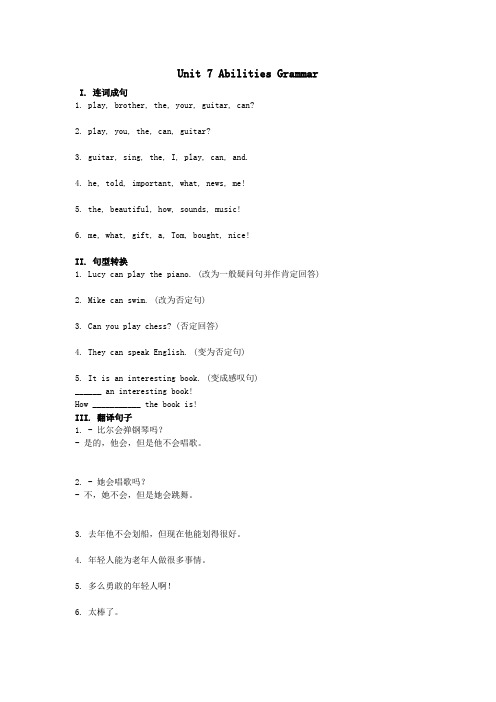
Unit 7 Abilities GrammarI. 连词成句1. play, brother, the, your, guitar, can?2. play, you, the, can, guitar?3. guitar, sing, the, I, play, can, and.4. he, told, important, what, news, me!5. the, beautiful, how, sounds, music!6. me, what, gift, a, Tom, bought, nice!II. 句型转换1. Lucy can play the piano. (改为一般疑问句并作肯定回答)2. Mike can swim. (改为否定句)3. Can you play chess? (否定回答)4. They can speak English. (变为否定句)5. It is an interesting book. (变成感叹句)______ an interesting book!How ___________ the book is!III. 翻译句子1. - 比尔会弹钢琴吗?- 是的,他会,但是他不会唱歌。
2. - 她会唱歌吗?- 不,她不会,但是她会跳舞。
3. 去年他不会划船,但现在他能划得很好。
4. 年轻人能为老年人做很多事情。
5. 多么勇敢的年轻人啊!6. 太棒了。
7. 这个电视节目真是有趣啊!8. 上个月他还不会滑雪,但是现在他学会了。
IV. 选择正确的答案1. —I hear you’ve got a new iPhone 4S. ______ I have a look?— Yes, certainly. (2012江苏苏州)A. MayB. DoC. ShallD. Should2. ______ you dance? We need some more actors for the talent show. (2012山东枣庄)A. NeedB. ShallC. MustD. Can3. Last year I ______ drive. I used to take the bus. (2012江西)A. couldB. couldn’tC. shouldD. shouldn’t4. — ______ I try on those shoes in the window?— ______. They are just on show. (2012 呼和浩特)A. Could; Yes, you canB. Can; Sorry, you could n’tC. Could; Sorry, you can’tD. Can; Yes, you could5. “______ delicious the ice cream is! Could you give me one more?” “Sure.” (2012贵州贵阳)A. WhatB. HowC. What a6. ______ an exciting basketball match! Miami Heat beat New York Knicks at last. (2012 湖北黄石)A. HowB. WhatC. ThatD. So7. Woo! ______ beautiful Changde is! (2012湖南常德)A. HowB. WhatC. What a8. ______ nice the ice cream looks! I can’t wait to t aste it. (2012江苏淮安)A. How aB. HowC. What aD. What9. ______ excellent basketball player Jeremy Lin (林书豪) is! I really love this talented guy. (2012山东东营)A. HowB. WhatC. How aD. What an10. — ______ fine day! Shall we go for a walk?— That sounds great! (2012湖北襄阳)A. WhatB. HowC. What aD. How a。
七年级英语下册Unit7AbilitiesPeriod7学案无答案新牛津
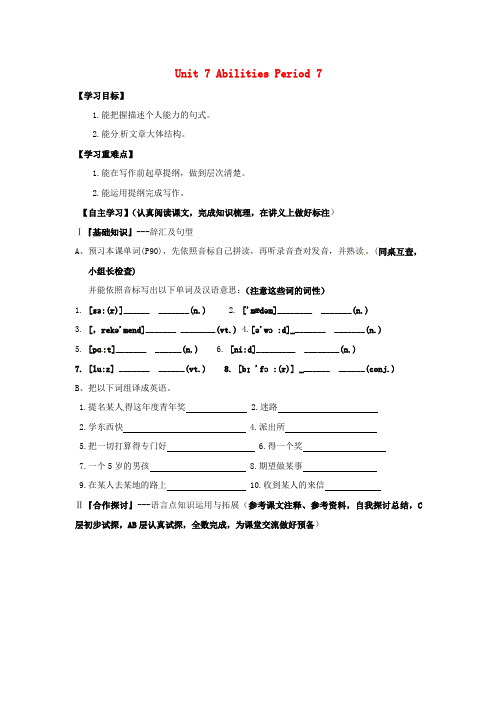
Unit 7 Abilities Period 7【学习目标】1.能把握描述个人能力的句式。
2.能分析文章大体结构。
【学习重难点】1.能在写作前起草提纲,做到层次清楚。
2.能运用提纲完成写作。
【自主学习】(认真阅读课文,完成知识梳理,在讲义上做好标注)Ⅰ『基础知识』---辞汇及句型A、预习本课单词(P90),先依照音标自己拼读,再听录音查对发音,并熟读。
(同桌互查,小组长检查)并能依照音标写出以下单词及汉语意思:(注意这些词的词性)1. [sɜ:(r)]______ _______(n.)2. ['mædəm]________ _______(n.)3.[,rekə'mend]_______ ________(vt.)4.[ə'wɔ:d]________ _______(n.)5. [pɑ:t]_______ ______(n.)6. [ni:d]_________ ________(n.)7.[lu:z] _______ ______(vt.) 8.[bɪ'fɔ:(r)] _______ ______(conj.)B、把以下词组译成英语。
1.提名某人得这年度青年奖2.迷路2.学东西快 4.派出所5.把一切打算得专门好6.得一个奖7.一个5岁的男孩 8.期望做某事9.在某人去某地的路上 10.收到某人的来信Ⅱ『合作探讨』---语言点知识运用与拓展(参考课文注释、参考资料,自我探讨总结,C 层初步试探,AB层认真试探,全数完成,为课堂交流做好预备)3. look forward to sth/ doing sth. 期望做某事I look forward to you again.我期望再一次见到你。
Children are to the Chinese New Year.小孩们正在盼望春节的到来。
4. hear from sb 受到某人的来信 =get/receive a letter fr om sb上周日我收到了我表妹的来信。
- 1、下载文档前请自行甄别文档内容的完整性,平台不提供额外的编辑、内容补充、找答案等附加服务。
- 2、"仅部分预览"的文档,不可在线预览部分如存在完整性等问题,可反馈申请退款(可完整预览的文档不适用该条件!)。
- 3、如文档侵犯您的权益,请联系客服反馈,我们会尽快为您处理(人工客服工作时间:9:00-18:30)。
Unit 7 Abilities Period 7
【学习目标】
1.能掌握描述个人能力的句式。
2.能分析文章基本结构。
【学习重难点】
1.能在写作前草拟提纲,做到条理清晰。
2.能运用提纲完成写作。
【自主学习】(认真阅读课文,完成知识梳理,在课本上做好标注)
Ⅰ『基础知识』---词汇及句型
A、预习本课单词(P90),先根据音标自己拼读,再听录音核对发音,并熟读。
(同桌互查,
小组长检查)
并能根据音标写出下列单词及汉语意思:(注意这些词的词性)
1. [sɜ:(r)]______ _______(n.)
2. ['mædəm]________ _______(n.)
3.[,rekə'mend]_______ ________(vt.)
4.[ə'wɔ:d]________ _______(n.)
5. [pɑ:t]_______ ______(n.)
6. [ni:d]_________ ________(n.)
7.[lu:z] _______ ______(vt.) 8.[bɪ'fɔ:(r)] _______ ______(conj.)
B、把下列词组译成英语。
1.提名某人得这年度青年奖
2.迷路
2.学东西快 4.派出所
5.把一切计划得很好
6.得一个奖
7.一个5岁的男孩 8.期望做某事
9.在某人去某地的路上 10.收到某人的来信
Ⅱ『合作探究』---语言点知识运用与拓展(参考课文注释、参考资料,自我探索总结,C 层初步思考,AB层认真思考,全部完成,为课堂交流做好准备)
3. look forward to sth/ doing sth. 期望做某事
I look forward to you again.我期望再一次见到你。
Children are to the Chinese New Year.孩子们正在盼望春节的到来。
4. hear from sb 受到某人的来信 =get/receive a letter fr om sb
上周日我收到了我表妹的来信。
I heard my cousin last Sunday.
=I a letter my cousin last Sun day.
【课堂达标检测】
一、用括号中所给词的适当形式填空。
1. The members recommend Chen Dan for this year’s (yo ung)Award.
2. Daniel is very clever and he can learn things (quick).
3. You’re too careless. You s hould be (think).
4. He thinks (careful)and makes few mist akes in exams.
5. She is (real)kind to others.
6.We (look) forward to your coming.
7. I’d like (take)some seafood to you tomorrow.
8. He (teach)me how to dance last week.
二、句型转换
1.We look forward to hearing from you soon.
We look forward to a from y ou soon.
st week, a boy aged 5 years old lost his way in the street.
Last week, a boy lost his way in the street.
3.He got lost in the street yesterday.
He his in the street yesterday.
三、书面表达 (11%)
假如你是Simon, 想推荐Mary获今年的优秀学生奖 (Good Student Award), 根据下面的要点,写一封信给王老师。
1. Mary对人友好,乐于助人,经常帮助我们打扫教室;
2. 学习努力,各门功课都很优秀,尤其对中国历史了解很多;
3. 她擅长游泳,有时教其他人游泳;
4. 上星期回家的路上,从河里救出一个四岁的小女孩,最后自己受凉住院了。
但她觉
得……
Dear Mr Wang,
I’d like to recommend Mary for this year’s Good Student Award.
_______________________________________________________________________________ _______________________________________________________________________________ _______________________________________________________________________________ _______________________________________________________________________________ ________________________________________________________________________
I think she should get the award. We look forward to hearing from you soon.
Yours, Simon。
